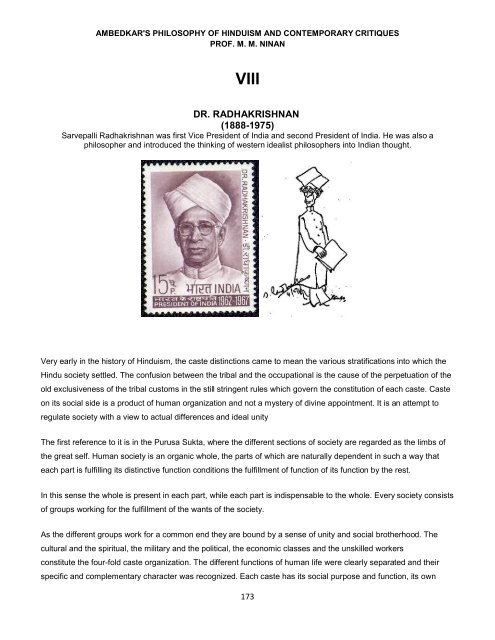Ambedkar-Philosophy of Hinduism
Create successful ePaper yourself
Turn your PDF publications into a flip-book with our unique Google optimized e-Paper software.
AMBEDKAR'S PHILOSOPHY OF HINDUISM AND CONTEMPORARY CRITIQUES<br />
PROF. M. M. NINAN<br />
VIII<br />
DR. RADHAKRISHNAN<br />
(1888-1975)<br />
Sarvepalli Radhakrishnan was first Vice President <strong>of</strong> India and second President <strong>of</strong> India. He was also a<br />
philosopher and introduced the thinking <strong>of</strong> western idealist philosophers into Indian thought.<br />
Very early in the history <strong>of</strong> <strong>Hinduism</strong>, the caste distinctions came to mean the various stratifications into which the<br />
Hindu society settled. The confusion between the tribal and the occupational is the cause <strong>of</strong> the perpetuation <strong>of</strong> the<br />
old exclusiveness <strong>of</strong> the tribal customs in the still stringent rules which govern the constitution <strong>of</strong> each caste. Caste<br />
on its social side is a product <strong>of</strong> human organization and not a mystery <strong>of</strong> divine appointment. It is an attempt to<br />
regulate society with a view to actual differences and ideal unity<br />
The first reference to it is in the Purusa Sukta, where the different sections <strong>of</strong> society are regarded as the limbs <strong>of</strong><br />
the great self. Human society is an organic whole, the parts <strong>of</strong> which are naturally dependent in such a way that<br />
each part is fulfilling its distinctive function conditions the fulfillment <strong>of</strong> function <strong>of</strong> its function by the rest.<br />
In this sense the whole is present in each part, while each part is indispensable to the whole. Every society consists<br />
<strong>of</strong> groups working for the fulfillment <strong>of</strong> the wants <strong>of</strong> the society.<br />
As the different groups work for a common end they are bound by a sense <strong>of</strong> unity and social brotherhood. The<br />
cultural and the spiritual, the military and the political, the economic classes and the unskilled workers<br />
constitute the four-fold caste organization. The different functions <strong>of</strong> human life were clearly separated and their<br />
specific and complementary character was recognized. Each caste has its social purpose and function, its own<br />
173


















